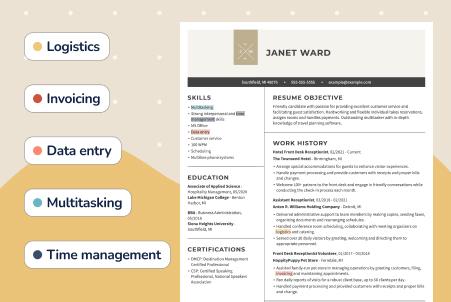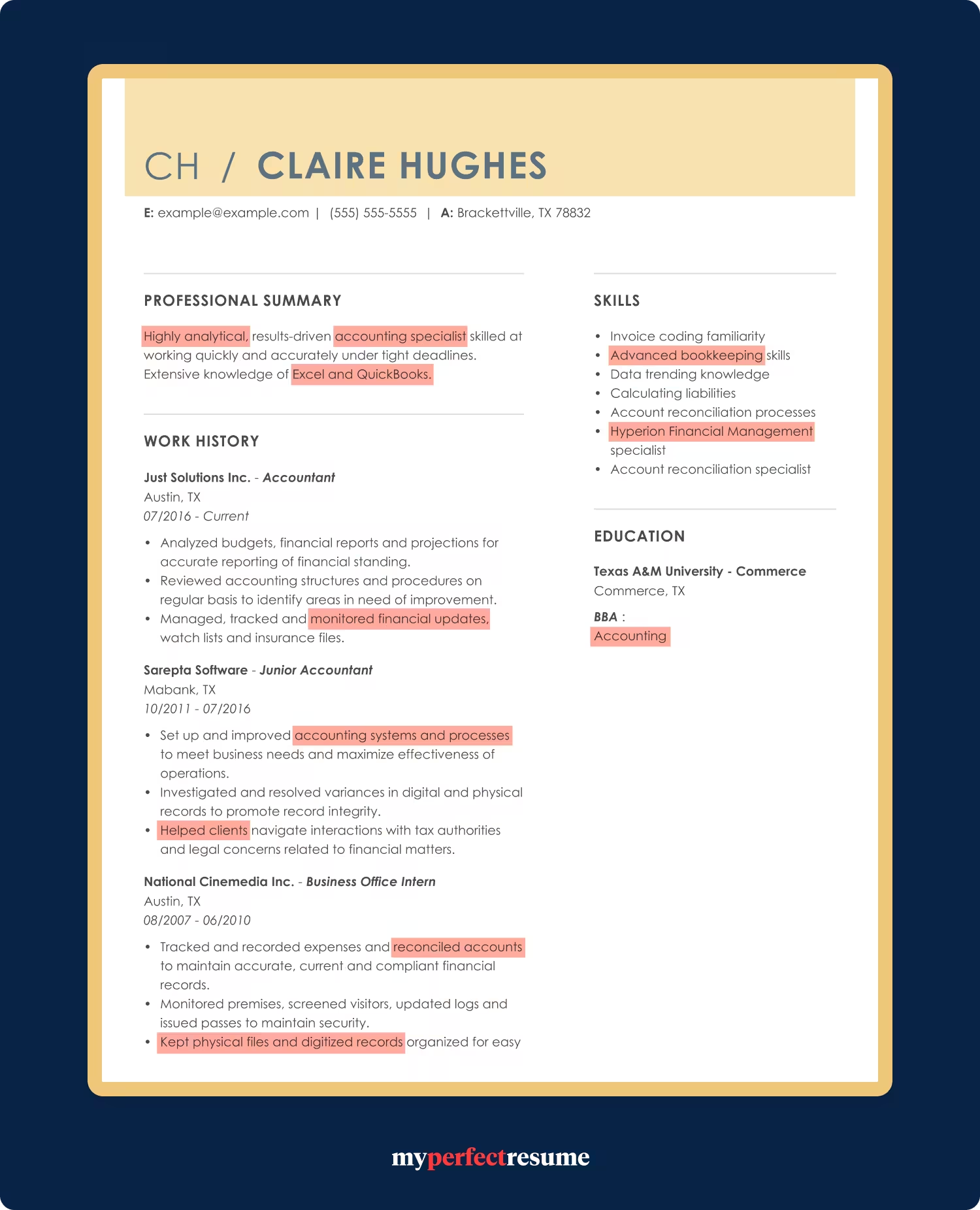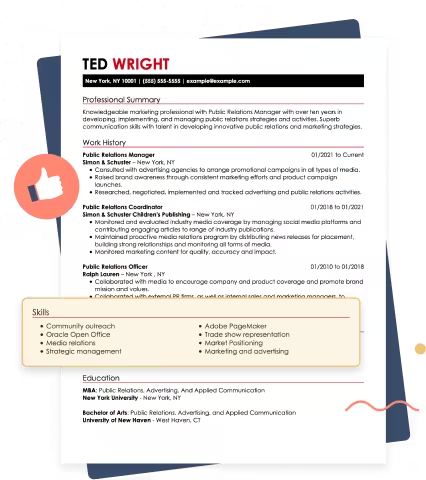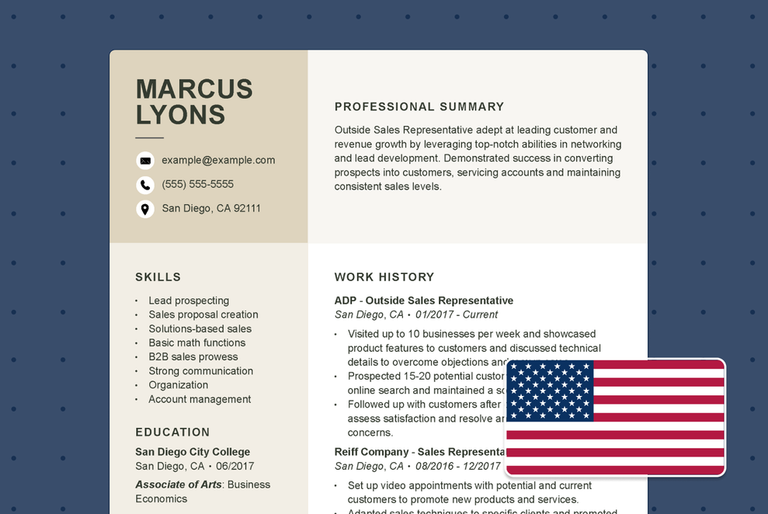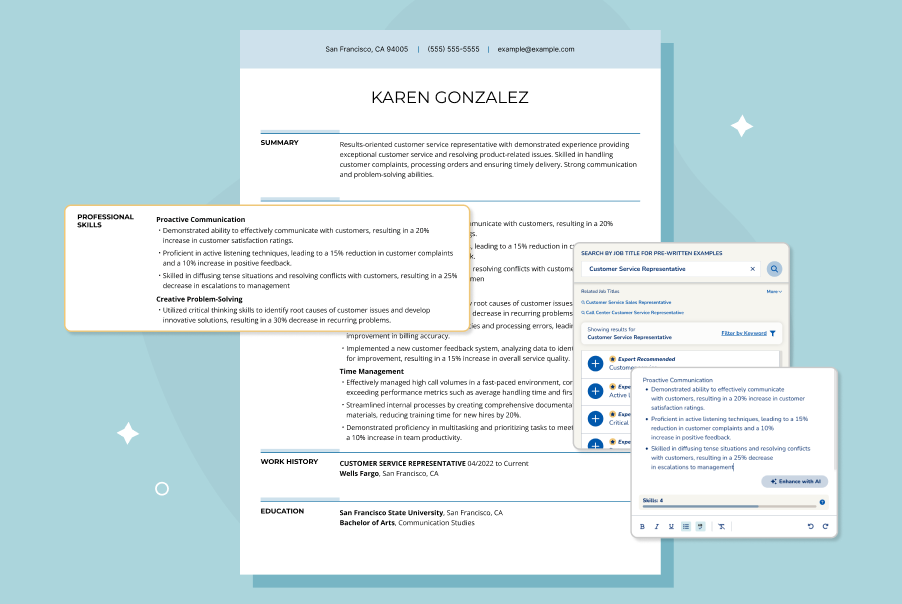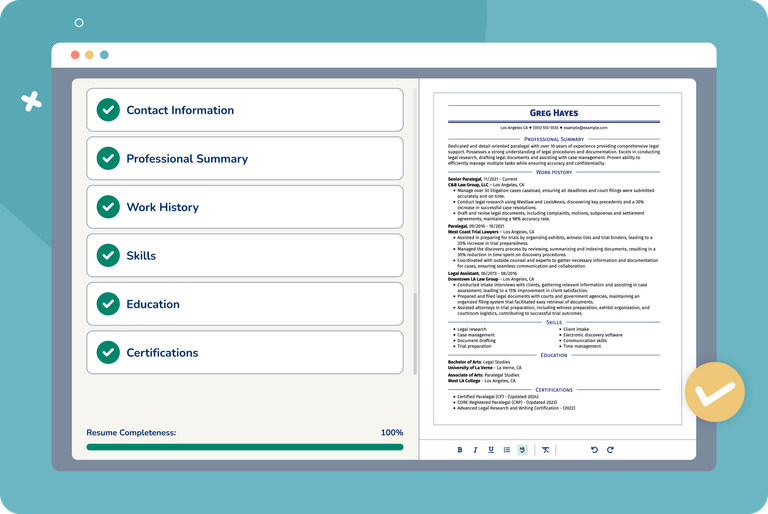Our customers have been hired at: *Foot Note
In today’s digital recruiting era, many companies use applicant tracking systems (ATS) to scan resumes for keywords that help identify the most qualified candidate for the role.
Writing an ATS-friendly resume that effectively uses relevant keywords can help you stand out from hundreds of other applicants and increase your chances of landing an interview.
In this guide, we’ll cover everything you need to know about resume keywords and phrases. Explore resume keyword lists by industry and learn how to incorporate them into your resume.
What Are Resume Keywords?
Resume keywords are specific words or phrases that relate to a job’s qualifications, skills, and industry-specific terminology.
They help applicant tracking systems (ATS) and recruiters quickly identify relevant candidates by scanning resumes for these targeted terms.
Keywords for resumes can take many forms, from past job titles to relevant certifications. Here are some examples of common types of resume keywords:
- Skills-based keywords: Highlight technical and soft skills (e.g., project management, data analysis, communication skills).
- Industry-specific keywords: Showcase expertise in a particular field (e.g., SEO for marketing, Agronomy for agriculture).
- Job title keywords: Align with the position you’re applying for (e.g., Sales Manager, Software Engineer).
- Action verbs: Demonstrate measurable achievements and responsibilities (e.g., managed, developed, increased).
- Certifications and tools: Display relevant qualifications (e.g., CPA and Salesforce for jobs in accounting, finance, and sales management).
Our Resume Builder offers professional content suggestions that include keywords such as job-specific skills and work experience bullet points.
Why Are Resume Keywords Important?
Creating a targeted resume that includes keywords from the job description indicates to ATS software and recruiters that you're a great fit for the role, increasing your chances of securing an interview.
Let’s take a look at the sample accounting specialist job description below. We’ve highlighted the industry-specific skills and qualifications for the role — these are the keywords that a job seeker applying for this role should incorporate throughout their resume.
Take a look at the example accounting resume below that demonstrates how a job seeker might choose to incorporate the keywords identified from the job description:
Use our free ATS Resume Checker to scan your resume for ATS compliance and get instant suggestions to improve your resume score.
How to Find Keywords for Your Resume
Scan the job description
The job description is the primary source for identifying resume keywords. The recruiter who wrote the job description will likely be the one directing the ATS to scan for specific words.
Depending on which ATS tool the company uses, the skills and qualifications incorporated throughout the job description might be worded exactly as the ATS will scan for them.
Read the job description carefully to understand what the employer is looking for in a candidate. Look for words and phrases that describe the skills, experience, and qualifications required for the job.
For example, take a look at the sample job description below. We’ve bolded keywords that highlight important skills and requirements the job seeker should work into their resume.
Customer Service Representative
ABC Company
Responsibilities:
- Respond to customer inquiries and concerns via phone, email and chat in a timely and professional manner.
- Provide accurate information about products and services to customers.
- Resolve customer complaints and issues by offering solutions and alternatives.
Requirements:
- High school diploma or equivalent
- 1+ years of customer service experience
- Proficient in Microsoft Office and other relevant software programs
Research industry-specific language
Look at job postings in your target industry and note the hard skills and soft skills required for each job. Pay attention to the specific language and industry jargon used in the job postings.
Research industry-specific websites and publications, such as trade journals, blogs and forums. These resources can give you insight into the latest trends, technologies and buzzwords in your field.
There are many keyword research tools available that can help you identify industry-specific keywords. Google’s Keyword Planner and SEMrush are some popular tools that can help you find commonly searched terms in your industry.
Explore our library of 40+ professional resume templates built by graphic designers to pass ATS and impress recruiters.
Network with professionals in your industry
Networking can help you stay current on the latest trends, technologies, and best practices in your industry.
This can help you identify the skills and experience that are in high demand and that employers are looking for in candidates.
Connect with professionals in your target industry through social media, professional organizations, or networking events.
They can provide valuable insight into the skills and qualifications that are important in your field.
See our professional networking advice for tips from career advice experts. Networking with professionals in your industry can help you gain insight into the industry-specific language and terminology used in your field.
Resume Keyword Lists by Industry
Remember that the job description is always the primary source for resume keywords. Scan it carefully to identify the essential skills and qualifications the employer is seeking.
We've compiled common resume keywords by industry to help you effectively tailor your resume to your target role. Jump to the following industries:
Agriculture
- Crop management
- Soil science
- Agribusiness
- Farm operations
- Irrigation systems
- Sustainable agriculture
- Livestock management
- Precision agriculture
- Horticulture
- Pest control
- Agricultural equipment operation
- Organic farming
- Supply chain management
- Agronomy
- Greenhouse management
- Harvesting techniques
- Fertilization strategies
- Food safety regulations
- Agricultural sales
Business consulting
- Strategic planning
- Business analysis
- Process improvement
- Change management
- Market research
- Project management
- Client relations
- Financial analysis
- Risk management
- Operations optimization
- Stakeholder engagement
- Competitive analysis
- Performance metrics
- Data-driven decision making
- Workshop facilitation
- Organizational development
- Cost reduction strategies
- Cross-functional collaboration
- Business transformation
- Problem-solving skills
Construction
- Project management
- Safety regulations
- Building codes
- Construction materials
- Site supervision
- Budgeting
- Quality control
- Blueprint reading
- Contract negotiations
- Scheduling
- Building inspections
- Subcontractor management
- Cost estimation
- Equipment operation
- Troubleshooting
Customer service
- Customer satisfaction
- Problem-solving
- Conflict resolution
- Communication skills
- Call center operations
- Active listening
- Multitasking
- CRM software (customer relationship management)
- Inbound & outbound calls
- Complaint resolution
- Customer retention
- Technical support
- Order processing
- Sales support
- Interpersonal skills
- Service recovery
- Help desk support
- Upselling & cross-selling
- Time management
- Team collaboration
Education
- Curriculum development
- Classroom management
- Instructional design
- Student assessment
- Educational technology
- Differentiated instruction
- Special education
- Professional development
- Learning management systems
- Lesson planning
- E-learning
- Student-centered learning
- Education policy
- Pedagogy
- Educational leadership
Finance
- Financial analysis
- Investment management
- Risk management
- Portfolio management
- Financial modeling
- Taxation
- Accounting
- Corporate finance
- Asset allocation
- Wealth management
- Financial planning
- Trading
- Securities
- Derivatives
- Banking
Government
- Policy development
- Budget management
- Program management
- Grant writing
- Legislative analysis
- Public administration
- Project management
- Contract management
- Regulatory compliance
- Security clearance
- Strategic planning
- Data analysis
- Government affairs
- Policy analysis
- Interagency collaboration
Healthcare
- Patient care
- Electronic medical records
- Healthcare administration
- Medical billing and coding
- Health informatics
- Quality assurance
- Clinical research
- Health care policy
- Healthcare management
- Health insurance
- Medical terminology
- Case management
- Healthcare compliance
- Public health
- Healthcare technology
Hospitality and tourism
- Customer service
- Event planning
- Food and beverage management
- Front desk management
- Hospitality management
- Hotel operations
- Sales and marketing
- Tourism industry
- Guest relations
- Reservation management
- Culinary arts
- Travel coordination
- Revenue management
- Venue management
- Conference and convention management
Information technology
- Software development
- Programming languages
- Cybersecurity
- Network administration
- Cloud computing
- Data analytics
- Project management
- IT support
- Information management
- System administration
- Database management
- Artificial intelligence
- Machine learning
- IT strategy
- Web development
Insurance
- Insurance policies
- Risk management
- Claims processing
- Underwriting
- Actuarial science
- Insurance sales
- Insurance regulations
- Policy development
- Customer service
- Sales and marketing
- Insurance law
- Fraud detection
- Property and casualty insurance
- Life insurance
- Health insurance
Legal
- Legal research
- Contract negotiation
- Litigation support
- Case management
- Legal writing
- Legal analysis
- Regulatory compliance
- Intellectual property law
- Corporate law
- Employment law
- Civil litigation
- Criminal law
- Mediation and arbitration
- Tax law
- Securities law
Manufacturing
- Production planning
- Quality control
- Lean manufacturing
- Supply chain management
- Inventory management
- Process improvement
- Manufacturing automation
- Material handling
- Safety compliance
- Equipment maintenance
- Six Sigma
- Root cause analysis
- Product development
- Continuous improvement
- Manufacturing engineering
Marketing
- Digital marketing
- Brand management
- SEO (search engine optimization)
- Content marketing
- Social media marketing
- Market research
- PPC (pay-per-click) advertising
- Email marketing
- Marketing strategy
- Google Analytics
- Campaign management
- Lead generation
- Public relations (PR)
- Conversion rate optimization (CRO)
- Influencer marketing
- Copywriting
- CRM (customer relationship management)
- Affiliate marketing
- Brand awareness
- Marketing automation
Media and entertainment
- Video production
- Audio production
- Script writing
- Editing
- Storytelling
- Cinematography
- Social media marketing
- Content creation
- Broadcast journalism
- Event planning
- Public relations
- Photography
- Graphic design
- Digital media
- Creative direction
Professional and business services
- Project management
- Business development
- Client relations
- Strategic planning
- Financial analysis
- Contract negotiation
- Sales management
- Marketing strategy
- Human resources management
- Operations management
- Change management
- Risk management
- Process improvement
- Data analysis
- Leadership development
Real estate
- Property management
- Real estate investment analysis
- Client relations
- Sales management
- Property appraisal
- Lease negotiation
- Market analysis
- Contract negotiation
- Real estate law
- Property development
- Real estate marketing
- Financial analysis
- Property inspection
- Property valuation
- Property tax assessment
Retail
- Sales management
- Customer service
- Inventory management
- Merchandising
- Retail operations
- Visual merchandising
- Product knowledge
- Team leadership
- Marketing strategy
- Point of sale (POS) systems
- Retail sales analysis
- Sales forecasting
- Staff training and development
- Vendor management
- Retail technology
Sales
- Lead generation
- Account management
- Business development
- Cold calling
- Customer relationship management (CRM)
- Sales forecasting
- Pipeline management
- Negotiation skills
- Closing sales
- Territory management
- B2B sales
- B2C sales
- Market analysis
- Revenue growth
- Product knowledge
- Cross-selling & upselling
- Competitive analysis
- Sales presentations
- Networking & prospecting
- Quota achievement
Tourism
- Hospitality management
- Customer service
- Event planning
- Travel coordination
- Tour operations
- Sales and marketing
- Itinerary planning
- Cultural awareness
- Guest relations
- Destination management
- Revenue management
- Hospitality technology
- Luxury travel
- Eco-tourism
- Travel regulations & compliance
Transportation and logistics
- Supply chain management
- Freight forwarding
- Logistics management
- Transportation planning
- Route optimization
- Warehouse management
- Inventory control
- Vendor management
- Import/export regulations
- Customs brokerage
- Carrier management
- Shipping documentation
- Load planning
- Dispatching
- Safety regulation compliance
How to Use Keywords in Your Resume
It's important to strike a balance between using relevant keywords and clearly and concisely describing your skills and experience.
Once you identify the keywords from the job description and other sources, you can group them into the following categories:
- Soft skills (e.g., communication, cross-team collaboration).
- Hard skills (e.g., HTML, Google Analytics).
- Job-related experience (e.g., social media marketing, copywriting.
- Action verbs (e.g., managed, coordinated).
- Job title, education level, certifications, and other prerequisites.
When you categorize the keywords you identified from the job description, you can map them to the resume section where they fit most naturally.
For instance, a skill-related keyword will go in the “Skills” section, and an action verb keyword can be used in the “Work History” section.
See our guide on what to put on a resume for additional guidance from experts about what to include in each section of your resume.
How to add keywords to your resume summary
Your resume summary is the first thing employers see when they review your application.
By including keywords in your resume summary and tailoring it to the job description, you can increase your chances of getting noticed and landing an interview.
For example, say that you gather the following keywords from the job description for a marketing role:
- Marketing manager
- Marketing strategies
- Market research
- Data-driven decisions
- Social media
- Email marketing campaigns
Here is an example of a resume summary you could write that incorporates the keywords you identified (keywords in red):
If you are writing a resume with no experience, you might consider using a resume objective instead of a resume summary.
Take a look at professionally written resume objective examples to explore how you can incorporate keywords.
You can use our free AI Resume Summary Generator to get personalized professional summaries that feature essential keywords from your resume.
How to add keywords to your work history section
Using keywords in the work history section of your resume is crucial to help it get noticed by potential employers.
Make sure you also showcase your achievements and accomplishments in your work history section.
Use specific examples and action verbs to describe your accomplishments and impact in past roles.
For example, let’s say you reading a job description that mentions the following requirements:
- Experience creating and executing successful social media campaigns.
- Ability to write compelling copy with successful click-through rate and conversion rate.
- Experience organizing and executing successful events.
Some of the keywords that stand out in these requirements include “social media campaigns,” “click-through rates,” “conversion rates,” and “organizing and executing events.”
Below is an example of how you could incorporate these keywords into the work history section of your resume (keywords in red):
WORK HISTORY
Marketing Coordinator
ABC Company, San Diego, CA
Feb. 2019 - Present
- Created and executed social media campaigns that increased engagement and boosted brand awareness.
- Wrote copy for email marketing campaigns, website content and promotional materials that increased click-through rates and conversion rates.
- Organized and executed a product launch event that generated buzz and increased sales.
How to add keywords to your skills section
Customize your skills section for each job application. Take note of which skills the job description emphasizes. Does it mostly mention hard skills, interpersonal skills, or a mix of both?
Prioritize the most relevant keywords and phrases in your skills section. This will help to catch the attention of potential employers and demonstrate that you have the skills they are looking for.
In the skills section of your resume, list your skills using bullet points. This will make it easy for employers to quickly scan your resume and pick out the skills they are looking for.
Take a look at the sample skills section below tailored to a job description that mentions "marketing strategy development," "market research," social media," and "email marketing" (keywords in red):
SKILLS
- Marketing strategy development and implementation
- Market research and analysis
- Social media management and content creation
- Email marketing campaigns and automation
How to add keywords to your education section
Include relevant keywords related to your field of study, coursework, and degrees. This will increase your chances of passing the ATS and help employers quickly identify your qualifications and expertise.
Use keywords to highlight your academic achievements or relevant coursework that demonstrate you have the necessary skills and experience to succeed in the role.
Let’s say the job description notes that the candidate must have a “Bachelor of Science in Marketing.” The job seeker should add this degree to their education section using the exact same wording.
In the example below, the job seeker targets keywords such as "Bachelor's degree in marketing," "marketing strategy” and “marketing campaigns" (keywords are bolded and italicized for reference):
EDUCATION
Bachelor of Science in Marketing, Purdue University - West Lafayette, Indiana
- Completed a capstone project on developing a comprehensive marketing strategy for a new product launch.
- Participated in a semester-long internship with a marketing agency, gaining hands-on experience in developing and executing marketing campaigns.
- Member of the Marketing Club, where I collaborated with peers on various marketing projects and attended industry events and workshops to stay up-to-date on industry trends and best practices.
How Do Applicant Tracking Systems Check for Keywords?
Many companies use applicant tracking systems (ATS) to store, organize, and track the influx of job applications they receive.
Most ATS tools have a resume parsing feature that extracts information from resumes, such as contact details, work experience, skills, and education.
Once this information is extracted and organized under a candidate’s profile, the recruiter can easily screen for the keywords they want to see on a candidate’s resume.
The following are some of the common methods that ATS tools use to scan for keywords in a resume:
- Exact match: The ATS looks for exact matches of the keywords and phrases listed in the job description. If the keywords match, the resume is considered a good fit and is flagged for further review. Whenever possible, it is a good idea to use exact-match keywords in your resume to demonstrate your fit for the role.
- Semantic matching: This method uses natural language processing (NLP) to identify similar or related terms that match the job requirements. For example, if the job description requires "project management," the ATS will also consider "team leadership" or "project coordination" as relevant keywords.
- Contextual analysis: The ATS considers the context in which the keywords appear to determine their relevance. For example, if the job requires experience with a specific software program, the ATS will look for the keyword in the context of a software-related skill or experience.
Ultimately, to increase your chances of getting through the ATS and landing an interview, it's important to use relevant keywords that accurately describe your skills and experience.
Check out our library of 800+ resume examples for different jobs and industries to see how professional resume writers incorporate keywords into a resume.
Resume Keyword Mistakes to Avoid
#1 Keyword stuffing
It's important to avoid keyword stuffing in your resume since it can make it difficult to read and may turn off hiring managers.
Incorporate keywords into your resume in a natural way that makes sense and adds value to the content. Refrain from listing keywords without any context or explanation.
Rather than solely adding keywords to your resume, create quality content that clearly and concisely showcases your skills and experience.
#2 Dishonest keywords
Although an ATS might not be able to detect dishonest keyword usage, hiring managers will certainly be able to when it comes time for an interview.
Employers may verify your credentials and experience during background checks, and if you are caught lying, it can result in rejection or even termination of employment.
Only use keywords that are relevant to the job you're applying for, and that accurately describe your skills and experience.
#3 Ignoring soft skills
Many job postings include soft skills as part of the job requirements. However, some job seekers focus only on hard skills and technical keywords.
It's important to include soft skills in your resume as well, such as "collaboration," "communication," "leadership," and "problem-solving."
While hard skills and technical knowledge are important, employers also want to know that you have the necessary soft skills to succeed in the job and fit in with the company culture.
Key Takeaways
- Resume keywords are specific words or phrases that describe a particular skill, experience, or qualification that an employer is seeking in a candidate.
- Keywords are used in resumes to optimize them for applicant tracking systems and to help recruiters quickly identify the most qualified candidates for a job.
- You can identify keywords to use in your resume by carefully scanning the job description for key skills and qualifications and by searching for industry-specific resume keywords.
- Keywords should be incorporated throughout your resume. Add them to the resume summary, work experience, skills, and education section.
- Use keywords naturally throughout your resume, focusing on quality over quantity. Only use keywords that accurately reflect your skills and professional experience.
FAQ
What keywords do applicant tracking systems look for?
The keywords that applicant tracking systems (ATS) look for vary depending on the job and industry.
However, some common keywords that are often used by resume scanners include:
- Job titles: To increase your chances of passing the ATS, make sure to include the specific job title you are applying for in your resume.
- Skills: Use relevant keywords that describe your professional skills and experience, such as “project management,” “communication,” or “data analysis.”
- Certifications: If you have any relevant certifications, make sure to include the certification name and any relevant keywords.
- Action verbs: Use action verbs that describe your accomplishments and skills, such as “managed,” “created,” or “developed.”
Ultimately, writing a resume that is error-free, properly formatted, and tailored to the job description is well on its way to passing ATS and wowing hiring managers.
Do resume keywords need to use exact wording?
Although some ATS tools can recognize variations of keywords, such as synonyms or related terms, others cannot. For this reason, it’s best to use exact wording if you can do so naturally and accurately.
However, that is not to say that you shouldn’t also use variations of the keywords throughout your resume. This will likely happen naturally when you target keywords that are highly relevant to your past experience and the role you are applying for.
For example, if a job posting lists “project management” as a required skill, you could also use related terms such as “project coordination” or “team leadership” to describe your experience in this area.
It’s also important to use a resume format that is easy to read (by screening software and people), and that accurately reflects your skills and qualifications. This will increase your chances of impressing employers and securing an interview.
Do all ATS tools scan resumes the same way?
No, not all ATS tools scan resumes the same way. Different ATS tools may use different algorithms, features, and capabilities to scan and analyze resumes. Some ATS tools are designed for specific industries or job types, while others are more general-purpose.
Additionally, some ATS systems may be more advanced than others, with features such as semantic matching, contextual analysis, and machine learning algorithms that can help improve the accuracy and relevance of search results.
It’s a good idea to use exact-match keywords from the job description in case your target company is using an older ATS that does not use semantic matching. We recommend using an AI resume builder, which can help you create a keyword-optimized resume.
Should I include keywords in my cover letter?
Yes, it’s a good idea to include keywords in your cover letter (in addition to your resume). A well-written cover letter is your opportunity to expand on the information in your resume and provide additional context for your qualifications and experience.
Including keywords in your cover letter can help reinforce your qualifications and make it clear that you are a good match for the job. Incorporate them into your sentences and paragraphs in a way that demonstrates your understanding of the job requirements and your relevant skills and experience.
Your cover letter should focus on the specific job and company in addition to using keywords. We recommend using our Cover Letter Generator to craft a compelling cover letter quickly and easily.
How do I get my resume to pass ATS?
Here are some tips to help your resume pass through applicant tracking systems (ATS) successfully:
- Use relevant keywords: It is essential to use relevant keywords that match the job description and requirements.
- Keep the format simple: Complex formatting, such as tables, columns, and graphics may confuse the ATS. Stick to a simple format with clear headings and bullet points.
- Use a standard font: Use a standard font such as Times New Roman, Arial, or Calibri. Avoid using unusual fonts that the ATS may not recognize.
- Include clear headings: Use clear headings such as “Work Experience,” “Education,” and “Skills” so that the ATS can easily identify the different sections of your resume.
- Customize your resume: Tailor your resume to match the specific requirements of the job and include relevant experience and skills.
- Use standard abbreviations: Use standard abbreviations such as “MBA” or “BA” instead of “Master of Business Administration” or “Bachelor of Arts.”
See our resume profile examples and resume About Me examples for tips on incorporating keywords into the introductory section of your resume.
Should I bold keywords in my resume?
Bolding certain words on your resume can help draw the hiring manager’s eye to important information that is relevant to the role.
However, it’s important to use bolding sparingly, strategically and consistently. Too much bolding can make your resume look cluttered and difficult to read.
For example, you might choose to bold job titles in the work history section of your resume or the names of the degrees that you’ve earned in the education section.
It is not advisable to bold skills or qualifications to draw attention to them, as this can compromise the visual consistency and readability of your resume.
Alternative ways to emphasize skill-related keywords in your resume include reducing the amount of surrounding content and incorporating more white space.
See our guide, what does a good resume look like, for tips on formatting your resume in a visually appealing way.
Does your location impact which resume keywords and phrases you should use?
In some instances, your geographic location can impact which keywords you should use on your resume.
This is because different regions and industries may use different terminologies and keywords to describe the same job or skill.
Certain keywords may be more popular or relevant in certain geographic locations. For example, a job seeker in the tech industry in Silicon Valley may need to use different keywords than someone in the same industry in New York City.
Research the job market and industry trends in your area to ensure that your resume includes the most relevant keywords for your geographic location.
Look at job postings and descriptions for similar roles in your area to identify common keywords and phrases used by employers.
How we reviewed this article
Since 2012, we have helped more than 11 million job seekers. We want to make your career journey accessible and manageable through our services and Career Center’s how-to guides and tips. In our commitment to bring you a transparent process, we present our Editorial Process.
Our customers have been hired at:*Foot Note

